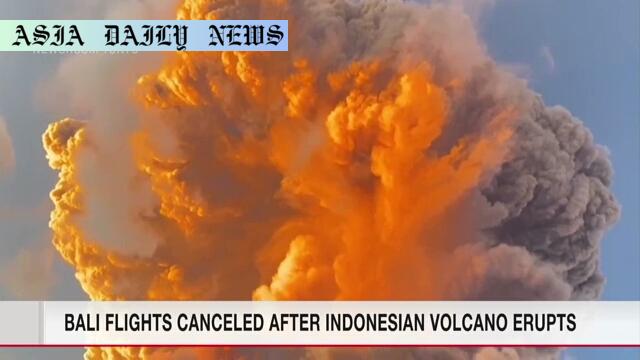Volcano Eruption: Mount Lewotobi’s powerful eruption forces evacuations, disrupts Bali travel, and raises serious ashfall concerns.
Mount Lewotobi erupted in Indonesia, causing severe travel disruptions.
Bali flights and international connections affected after ashfall.
Residents evacuated amid raised alerts and local ash concerns.
Over 30 flights canceled, impacting travelers from Australia, India, and Singapore.

The Impact of Mount Lewotobi’s Eruption
A powerful volcanic eruption from Mount Lewotobi Laki-laki on Indonesia’s Flores Island has caused severe travel disruptions and safety concerns. The eruption, which occurred on Tuesday, spewed a tremendous ash column soaring 10 kilometers into the atmosphere. Local authorities were quick to respond, raising the volcano’s alert status to its highest level. This decision was accompanied by warnings of potentially dangerous volcanic mudflows, especially in nearby rivers, which could further endanger local communities.
The immediate aftermath saw thousands of residents in two nearby villages evacuated. Eyewitness accounts describe streets blanketed in ash and gravel, with some residents recalling torrential rainfall of stones and ash on their properties. One woman noted the terror she experienced as volcanic debris coated her home and forced her to flee. Thankfully, no casualties were reported, though the eruption disrupted daily life and livelihoods in the area.
Bali Travel Disruptions and Airline Cancelations
Among the most significant ripple effects of the eruption has been the disruption to travel. Over 30 international and domestic flights to and from Bali, Indonesia’s most famous tourist destination, were canceled. Bali’s airport operator confirmed that flights from major cities such as Singapore, Australia, and India were particularly affected. Travelers were left stranded, with many facing considerable delays in reaching their destinations. Airlines are now working diligently to reschedule flights and inform passengers of the ongoing situation. The ash cloud also poses a significant risk to air traffic safety, explaining the precautionary measures taken by airport authorities.
Local Authorities Issue Precautions
Indonesia’s volcano monitoring agency continues to monitor Mount Lewotobi closely, given its volatile activity. Local authorities have warned residents about the risks of further eruptions and resultant ashfall. Volcanic mudflows, also known as lahars, present another serious concern, as they can lead to the swift destruction of infrastructure and pose a life-threatening danger to anyone in their path. Emergency services remain on high alert, ready to respond to any further disasters or escalations from this geological event. Public outreach and education have also been initiated, ensuring that residents understand the risks and follow proper safety protocols.
Environmental and Economic Ramifications
The eruption’s environmental and economic impacts are also noteworthy. Airborne ash from the volcano has significant implications for air quality, agriculture, and ecosystems in surrounding areas. Crops in the immediate region are likely to face damage as ash settles and covers farmland, creating further economic strain for local farmers. The halt in tourism due to flight cancellations also delivers a blow to Bali’s economy, as the island heavily relies on international and domestic tourists. Tour operators and local businesses are bracing for a downturn in revenue as cancellations and disruptions mount.
Global Attention on Indonesia’s Volcanic Activity
Indonesia, part of the Pacific ‘Ring of Fire,’ is no stranger to volcanic eruptions. It is home to over 120 active volcanoes, many of which pose a constant threat to the densely populated islands in the archipelago. The eruption of Mount Lewotobi serves as a powerful reminder of the geological volatility of the region. International efforts could increase to study and mitigate risks associated with active volcanoes, which could reduce future disruptions and improve community preparedness. As the situation develops, scientists will surely use this event to analyze patterns and better safeguard residents.



Commentary
The Human Costs of Volcanic Eruptions
There is no doubt that natural disasters leave a lasting imprint on communities, and the volcanic eruption on Mount Lewotobi is a stark example. Though no casualties were thankfully reported this time, the emotional trauma endured by the residents is undeniable. Imagine hearing a deafening roar, only to witness ash, stones, and gravel cascading from the sky. Such moments become etched in one’s memory, a constant reminder of nature’s unpredictability and potency.
The Intersection of Nature and Modern Travel
The impact on Bali’s aviation sector underscores the intersection between natural events and modern globalization. Bali, serving as one of Asia’s most visited tourist spots, depends heavily on seamless international travel. However, the sheer force of volcanic activity brought an empire of machines and schedules to a standstill. This also raises broader concerns about whether aviation hubs located close to active volcanic regions are adequately equipped to handle such recurring disruptions. Are we investing enough in predictive tools and rapid response systems for these inevitable scenarios?
Sustainability and Preparedness
The eruption also serves as a wake-up call for sustainability and disaster preparedness. While monitoring agencies provided early alerts, the scale of flight disruptions hints at lingering gaps in aviation responses to natural disasters. As climate change contributes to more unpredictable weather and natural phenomena, governments and international agencies must strengthen their contingency plans and prioritize the well-being of communities on the ground. Beyond assisting tourists, it’s essential to support the local residents who often lack resources to recover from the economic turmoil caused by such disasters.